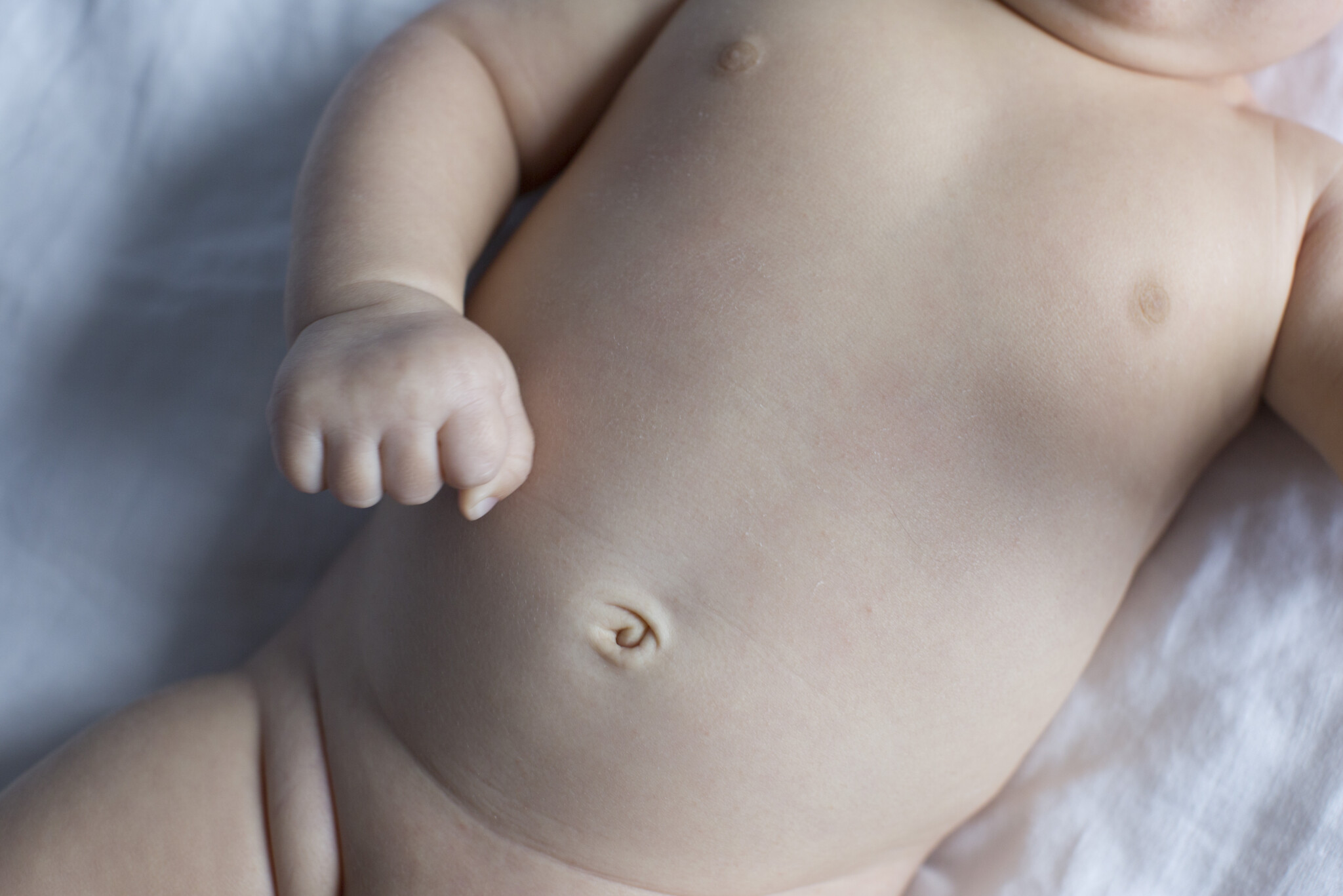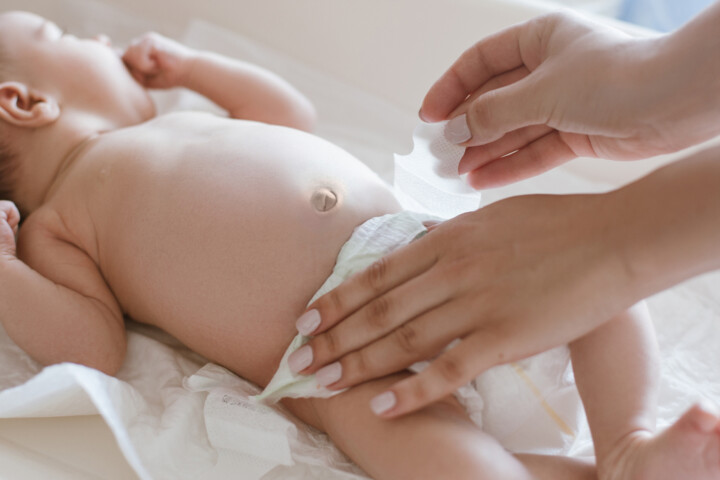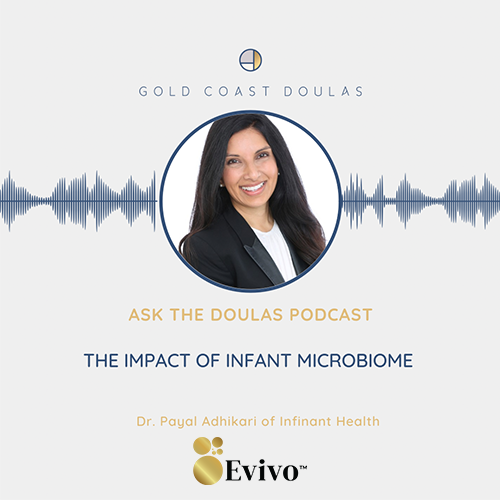A Beginners Guide to Infant Gut Health

By: Dr. Payal Adhikari
Pediatrician, Clinical Implementation Director
Health-conscious parents are likely to see a lot of information out there about infant gut health. That’s because scientists are learning more each day about the vital role our gut plays in our overall health. If you have seen terms like microbiome, gut bacteria, and probiotics, you may be wondering what it all means. Especially, since there are so many options in the marketplace that can make the topic confusing.
This article will break it down for you—and answer your questions, so you can spend more time caring for your little one, and less time looking for peace of mind.
What is the gut microbiome?
The microbiome is the community of organisms in and on our bodies. There are over 100 trillion bacteria, viruses and fungi in our microbiome. Many have important roles to support overall health and wellbeing. The largest microbiome is found in the gut, more specifically in the large intestine or colon.
In particular, the gut microbiome can have many beneficial jobs, including aiding digestion, nutrient absorption, and immune system development. Your GI tract can be considered a tube with a large surface area that is exposed to the outside world and the gut systems help protect and educate the infant about the world around them. So, it makes sense that 80% of the human immune system is in our gut, and much of our body’s ability to fight diseases is determined in the first few months after we are born.
How do babies get their gut bacteria?
Babies are born with a naïve GI tract, meaning without microorganisms inside. During the birthing process, a baby’s microbiome begins to develop through exposure to their environment. Babies who are born vaginally have early exposure from the birth canal, mom’s skin, and even mom’s poop! Whereas cesarean section babies receive microorganisms mostly from mom’s skin flora.
After birth, more bacteria enter baby’s digestive system through human interaction and feeding. If mom is breastfeeding, her diet impacts her microbiome and her baby’s. In fact, mom’s breast milk can have a considerable influence on which organisms thrive in the baby’s gut.
Historically, babies were exposed to a specific good gut bacteria known as Bifidobacterium infantis. The job of B. infantis is to help babies digest important nutrients in breast milk, which are called human milk oligosaccharides or HMOs. Due to the unintended consequences of modern practices—c-sections, antibiotic use, and even daily showering—90% of babies in the U.S. do not have this important bacterium.
Why is the gut microbiome so important?
Research shows that our gut health impacts many aspects of our overall health. Our microbiome provides signals to our neurologic, metabolic, and immune systems. In the first few years of life, it can be altered by our diet and environment until it becomes mostly established around three years of age.
When babies are born, their bodies can be filled with “good” bacteria, such as B. infantis that promote healthy digestion and immunity. Research suggests when a baby’s gut is filled with “good” bacteria, it supports the development of a stronger immune system throughout life.
How do I choose the right probiotic for my baby?
Probiotics are a broad and overwhelming category of supplements! Like antibiotics, probiotics serve different purposes depending on who is taking them and for what reason. For breastfed babies, Evivo is the only probiotic that contains B. infantis EVC001. While other probiotics may have different strains of B. infantis, Evivo is the only one that can fully consume all of the HMOs in breast milk.
Evivo is also unique because it doesn’t just pass through, but maintains a presence. Within 3 days of taking Evivo, studies show babies increased good bacteria by 5X and in a month reached a 70% increase.5, 7, 8. More good bacteria for longer means less gas and happier babies!
Studies also show that Evivo protects the mucin layer of the gut4, leading to less mucous in stools. Parents of babies who received Evivo also reported less diaper rash and fewer, less watery stools per day5.
What if my baby is getting some formula?
We believe in finding a feeding plan that is right for your baby and your family. More than 70% of families in the U.S. combination-feed with breast milk and formula or use formula exclusively. B. infantis EVC001 is good for babies and the HMO found in breast milk and some formulas helps kick-start a healthy infant gut microbiome.
How do I give Evivo to my baby?
Babies can start taking Evivo as soon as they are taking breast milk.For healthy full-term infants, Evivo comes in little powder sachets that you give once each day. The earlier you start, the more room your baby has for the beneficial bacteria to take over.
Here are a few ways you can feed your baby Evivo:
- Mix it with a few milliliters of breast milk and offer via syringe.
- Mix the powder with breast milk to form a paste and apply the paste directly to your nipple before nursing.
- Put the powder directly into a bottle of breast milk or formula that you know your baby will finish.
- You can order Evivo directly from www.evivo.com, Amazon, or even add it to your baby registry.
How do I know if Evivo is working?
Most of the benefits of a healthy gut microbiome are long-term, but parents report some exciting short-term benefits after starting Evivo:
- After one week of use, parents report decreased gas, diaper rash, colic, and improved sleep5.
- Babies also usually have fewer and better formed, less watery stools–happier babies and fewer diapers!
- Not all babies need a change in their bowel movements to indicate Evivo is working. If your baby is receiving Evivo and breast milk daily, Evivo is working.
About the Author
Payal Adhikari, MD, Pediatrician, Clinical Implementation Director
Payal Adhikari, M.D. is a pediatrician and Clinical Implementation Director for Infinant Health. She grew up in the Chicago suburbs and lived in Singapore prior to settling in Chicago with her husband and two kids. She encourages her patients to have fun with parenting and believes in the power of the early microbiome to create healthier and happier babies.
Citations
- Navarro-Tapia et al. “Probiotic Supplementation during the Perinatal and Infant Period: Effects on gut Dysbiosis and Disease.” Nutrients. August 2020.
- Seppo et al. “Infant Gut Microbiome Is Enriched with Bifidobacterium longum ssp. infantis in Old Order Mennonites with Traditional Farming Lifestyle.” Allergy. November 2021.
- O’Brien et al. “Early probiotic supplementation with B. infantis in breastfed infants leads to persistent colonization at 1 year.” Pediatric Research. 2022.
- Karav et al, “Reduced colonic mucin degradation in breastfed infants colonized by Bifidobacterium longum subsp. infantis EVC001.” FEBS Open Bio. August 2018.
- Dimitriatos et al. “Symptomatic relief from at-home use of activated Bifidobacterium infantis EVC001 probiotic in infants: results from a consumer survey on the effects on diaper rash, colic symptoms, and sleep.” Beneficial Microbes. February 2021.
- Bjorak et al. “B. infantis EVC001 Is Well-Tolerated and Improves Human Milk Oligosaccharide Utilization in Preterm Infants in the Neonatal Intensive Care Unit.” Frontiers in Pediatrics. January 2022.
- Frese, et al. Persistence of supplemented Bifidobacterium longum subsp. infantis EVC001 in breastfed infants. MSphere 2.6 (2017): e00501-17.
- Casaburi, Giorgio, et al. “Early-life gut microbiome modulation reduces the abundance of antibiotic-resistant bacteria.” Antimicrobial Resistance & Infection Control 8.1 (2019): 1-18.



